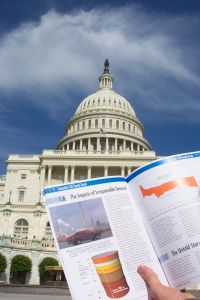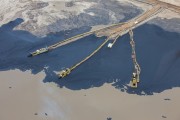When it comes to the future of Canada's oilsands, it's increasingly rare to have a dull day here in Washington, D.C. Even in the dwindling days before the congressional mid-term elections, powerful American lawmakers raised pointed questions about impacts from oilsands development. It seems the public relations efforts by the Government of Alberta and industry are not having the intended effect.
Today 11 U.S. Senators sent a letter to Secretary of State Hillary Clinton raising questions about the impacts of oilsands on climate and the environment with respect to a proposed TransCanada Keystone XL pipeline, which would transport oilsands from Alberta to the U.S. Gulf coast. The Senators asked for answers to a long list of well-informed questions, indicating they were concerned about how filling this proposed pipeline would create environmental and climate change impacts both in Canada and in the United States.
 Last week there was a flurry of media coverage suggesting that approval of this controversial pipeline, which would be granted by the U.S. Department of State, is a slam dunk. The coverage arose from some off-the-cuff remarks by Clinton, who indicated that the Department of State is "inclined" to approve Keystone XL, noting that "...we're either going to be dependent on dirty oil from the Gulf or dirty oil from Canada."
Last week there was a flurry of media coverage suggesting that approval of this controversial pipeline, which would be granted by the U.S. Department of State, is a slam dunk. The coverage arose from some off-the-cuff remarks by Clinton, who indicated that the Department of State is "inclined" to approve Keystone XL, noting that "...we're either going to be dependent on dirty oil from the Gulf or dirty oil from Canada."
But for those who might take solace in these words, it's worth boning up on the complicated process and myriad of regulators and lawmakers who will influence whether or not approval is ultimately granted.
Serious concerns and questions were raised by other federal agencies reviewing the Draft Environmental Impact Statement for Keystone XL, suggesting the Obama administration is not unified on this issue. For example, the Environmental Protection Agency gave the environmental impact statement its lowest possible ranking, and flagged numerous deficiencies.
Similarly, the Department of Energy questioned some of the core arguments in support of the pipeline, and the Department of Interior submitted more than 30 pages of additional questions and comments.
But it's not just various arms of Obama's administration raising difficult questions. Members of Congress have been wading in as they learn more about the pipeline and the prospect of increased American reliance on Canadian oilsands. As I wrote in July, Representative Waxman (D-CA), the powerful chair of the House Energy and Commerce Committee, and more than 50 House members expressed their opposition to the pipeline based on its environmental and climate impacts. More recently, Senators Johanns (R-NE) and Nelson (D-NE) sent individual letters (see here and here) to Secretary Clinton expressing concern over potential damage to the nearby Ogallala aquifer in the event of a pipeline spill.
 Meanwhile — just a day after the Government of Alberta rolled out new ads touting the oilsands as environmentally responsible and mere days after Syncrude was fined $3 million for the deaths of 1,606 birds on its tailings lakes — another unfortunate flock of ducks has once again landed on a number of toxic tailings lakes in the oilsands.
Meanwhile — just a day after the Government of Alberta rolled out new ads touting the oilsands as environmentally responsible and mere days after Syncrude was fined $3 million for the deaths of 1,606 birds on its tailings lakes — another unfortunate flock of ducks has once again landed on a number of toxic tailings lakes in the oilsands.
At risk of sounding like a broken record, in the face of a growing body of evidence about the environmental harms of oilsands development and increasing global scrutiny, it is becoming increasingly untenable for the Alberta government to remain more focused on public relations than on enforcing its own regulations and for the federal government to remain AWOL.
It pains me to ask the increasingly obvious question: just how tarnished will Canada's international reputation become before its political and business leaders wake up?








